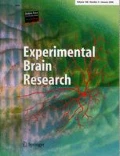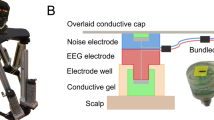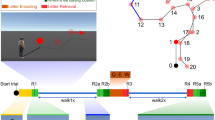Abstract
The use of functional magnetic resonance imaging (fMRI) to examine mental imagery of locomotion has become an attractive way to investigate supraspinal gait control in humans. Whereas cerebral activation patterns associated with walking along a straight line have already been investigated, data on activations associated with the initiation of turns and the maintenance of a curved path are sparse. Electrophysiological findings in animals show that electrical stimulation of the striatum induces a contraversive turn of eyes, head, and body. In the present study, fMRI was used to investigate brain activity in 12 healthy volunteers during mental imagery of walking along a curved path, walking straight ahead, and upright stance. The major findings were as follows: (1) A shift of activation to the hemisphere contralateral to the turn was found in the putamen, and—for initiation of the turn—in the caudate nucleus. These findings confirm the important role of the striatum in the initiation of movement and the execution of contraversive body turns. (2) Parahippocampal and fusiform gyri, known to be involved in visually guided navigation, showed more activity when walking along a curved path than when walking straight ahead. (3) Deactivations were found in the superior and medial temporal gyri, areas belonging to the multisensory and vestibular cortical network. This reduced activity may reflect the suppression of vestibular signal processing in favour of—potentially conflicting—visual input. (4) Mental imagery of walking along a curved path induced ipsiversive eye movements in most subjects, as did actually walking along a curve. These data complement earlier findings on the role of anticipatory eye movements during initiation of turns and suggest that there is a very close neurophysiologic relation between locomotion and its mental imagery.



Similar content being viewed by others
References
Akaike N, Ohno T, Tsubokawa H (1989) EMG activities of neck muscles underlying lateral flexion of the neck during head-turning induced by electrical stimulation of the caudate nucleus in cats. Neurosci Res 6:397–410
Bakker M, De Lange FP, Helmich RC, Scheeringa R, Bloem BR, Toni I (2008) Cerebral correlates of motor imagery of normal and precision gait. Neuroimage 41:998–1010
Bense S, Bartenstein P, Lochmann M, Schlindwein P, Brandt T, Dieterich M (2004) Metabolic changes in vestibular and visual cortices in acute vestibular neuritis. Ann Neurol 56:624–630
Berman RA, Colby CL, Genovese CR, Voyvodic JT, Luna B, Thulborn KR, Sweeney JA (1999) Cortical networks subserving pursuit and saccadic eye movements in humans: an FMRI study. Hum Brain Mapp 8:209–225
Binkofski F, Amunts K, Stephan KM, Posse S, Schormann T, Freund HJ, Zilles K, Seitz RJ (2000) Broca’s region subserves imagery of motion: a combined cytoarchitectonic and fMRI study. Hum Brain Mapp 11:273–285
Brandt T, Strupp M, Benson J (1999) You are better off running than walking with acute vestibulopathy. Lancet 354:746
Courtine G, Schieppati M (2003) Human walking along a curved path. I. Body trajectory, segment orientation and the effect of vision. Eur J Neurosci 18:177–190
Cutting JE, Readinger WO, Wang RF (2002) Walking, looking to the side, and taking curved paths. Percept Psychophys 64:415–425
Decety J, Perani D, Jeannerod M, Bettinardi V, Tadary B, Woods R, Mazziotta JC, Fazio F (1994) Mapping motor representations with positron emission tomography. Nature 371:600–602
Deutschlander A, Marx E, Stephan T, Riedel E, Wiesmann M, Dieterich M, Brandt T (2005) Asymmetric modulation of human visual cortex activity during 10 degrees lateral gaze (fMRI study). Neuroimage 28:4–13
Dietz V (2003) Spinal cord pattern generators for locomotion. Clin Neurophysiol 114:1379–1389
Dimitrijevic MR, Gerasimenko Y, Pinter MM (1998) Evidence for a spinal central pattern generator in humans. Ann N Y Acad Sci 860:360–376
Ekstrom AD, Kahana MJ, Caplan JB, Fields TA, Isham EA, Newman EL, Fried I (2003) Cellular networks underlying human spatial navigation. Nature 425:184–188
Epstein R, Kanwisher N (1998) A cortical representation of the local visual environment. Nature 392:598–601
Freund HJ (1990) Premotor area and preparation of movement. Rev Neurol (Paris) 146:543–547
Frison L, Pocock SJ (1992) Repeated measures in clinical trials: analysis using mean summary statistics and its implications for design. Stat Med 11:1685–1704
Friston KJ, Frith CD, Turner R, Frackowiak RS (1995a) Characterizing evoked hemodynamics with fMRI. Neuroimage 2:157–165
Friston KJ, Holmes AP, Poline JB, Grasby PJ, Williams SC, Frackowiak RS, Turner R (1995b) Analysis of fMRI time-series revisited. Neuroimage 2:45–53
Frith CD, Friston K, Liddle PF, Frackowiak RS (1991) Willed action and the prefrontal cortex in man: a study with PET. Proc Biol Sci 244:241–246
Fukuyama H, Ouchi Y, Matsuzaki S, Nagahama Y, Yamauchi H, Ogawa M, Kimura J, Shibasaki H (1997) Brain functional activity during gait in normal subjects: a SPECT study. Neurosci Lett 228:183–186
Gardiner TW, Nelson RJ (1992) Striatal neuronal activity during the initiation and execution of hand movements made in response to visual and vibratory cues. Exp Brain Res 92:15–26
Genovese CR, Lazar NA, Nichols T (2002) Thresholding of statistical maps in functional neuroimaging using the false discovery rate. Neuroimage 15:870–878
Glasauer S, Schneider E, Jahn K, Strupp M, Brandt T (2005) How the eyes move the body. Neurology 65:1291–1293
Gottlieb J (2007) From thought to action: the parietal cortex as a bridge between perception, action, and cognition. Neuron 53:9–16
Grasso R, Prevost P, Ivanenko YP, Berthoz A (1998) Eye–head coordination for the steering of locomotion in humans: an anticipatory synergy. Neurosci Lett 253:115–118
Hauber W (1998) Involvement of basal ganglia transmitter systems in movement initiation. Prog Neurobiol 56:507–540
Hicheur H, Vieilledent S, Berthoz A (2005) Head motion in humans alternating between straight and curved walking path: combination of stabilizing and anticipatory orienting mechanisms. Neurosci Lett 383:87–92
Hollands MA, Patla AE, Vickers JN (2002) “Look where you’re going!”: gaze behaviour associated with maintaining and changing the direction of locomotion. Exp Brain Res 143:221–230
Imai T, Moore ST, Raphan T, Cohen B (2001) Interaction of the body, head, and eyes during walking and turning. Exp Brain Res 136:1–18
Jacobs JV, Horak FB (2007) Cortical control of postural responses. J Neural Transm 114:1339–1348
Jahn K, Deutschlander A, Stephan T, Kalla R, Wiesmann M, Strupp M, Brandt T (2008) Imaging human supraspinal locomotor centers in brainstem and cerebellum. Neuroimage 39:786–792
Jahn K, Deutschlander A, Stephan T, Strupp M, Wiesmann M, Brandt T (2004) Brain activation patterns during imagined stance and locomotion in functional magnetic resonance imaging. Neuroimage 22:1722–1731
Jahn K, Kalla R, Karg S, Strupp M, Brandt T (2006) Eccentric eye and head positions in darkness induce deviation from the intended path. Exp Brain Res 174:152–157
Jeannerod M, Decety J (1995) Mental motor imagery: a window into the representational stages of action. Curr Opin Neurobiol 5:727–732
Jiang T, He Y, Zang Y, Weng X (2004) Modulation of functional connectivity during the resting state and the motor task. Hum Brain Mapp 22:63–71
Malouin F, Richards CL, Jackson PL, Dumas F, Doyon J (2003) Brain activations during motor imagery of locomotor-related tasks: a PET study. Hum Brain Mapp 19:47–62
Mellet E, Petit L, Mazoyer B, Denis M, Tzourio N (1998) Reopening the mental imagery debate: lessons from functional anatomy. Neuroimage 8:129–139
Miyai I, Tanabe HC, Sase I, Eda H, Oda I, Konishi I, Tsunazawa Y, Suzuki T, Yanagida T, Kubota K (2001) Cortical mapping of gait in humans: a near-infrared spectroscopic topography study. Neuroimage 14:1186–1192
Peterson SL (1986) Electroconvulsive shock and l-dopa reduce head-turning induced by electrical stimulation of the caudate nucleus in the rat. Exp Neurol 91:463–470
Reiss M, Reiss G (1997) Lateral preferences in a German population. Percept Mot Skills 85:569–574
Ruby P, Decety J (2001) Effect of subjective perspective taking during simulation of action: a PET investigation of agency. Nat Neurosci 4:546–550
Sacco K, Cauda F, Cerliani L, Mate D, Duca S, Geminiani GC (2006) Motor imagery of walking following training in locomotor attention. The effect of “the tango lesson”. Neuroimage 32:1441–1449
Schmahmann JD, Doyon J, Toga AW, Petrides M, Evans AC (2008) MRI atlas of the human cerebellum. Academic Press, San Diego
Schultz W, Romo R (1988) Neuronal activity in the monkey striatum during the initiation of movements. Exp Brain Res 71:431–436
Shima K, Mushiake H, Saito N, Tanji J (1996) Role for cells in the presupplementary motor area in updating motor plans. Proc Natl Acad Sci USA 93:8694–8698
Talairach J, Tournoux P (2008) Co-planar stereotactic atlas of the human brain. Thieme Stuttgart, New York
Tanji J, Shima K, Mushiake H (1996) Multiple cortical motor areas and temporal sequencing of movements. Brain Res Cogn Brain Res 5:117–122
Tzourio-Mazoyer N, Landeau B, Papathanassiou D, Crivello F, Etard O, Delcroix N, Mazoyer B, Joliot M (2002) Automated anatomical labeling of activations in SPM using a macroscopic anatomical parcellation of the MNI MRI single-subject brain. Neuroimage 15:273–289
Woods RP (1996) Modeling for intergroup comparisons of imaging data. Neuroimage 4:S84–S94
Yeomans JS, Buckenham KE (1992) Electrically evoked turning: asymmetric and symmetric collision between anteromedial cortex and striatum. Brain Res 570:279–292
Author information
Authors and Affiliations
Corresponding author
Rights and permissions
About this article
Cite this article
Wagner, J., Stephan, T., Kalla, R. et al. Mind the bend: cerebral activations associated with mental imagery of walking along a curved path. Exp Brain Res 191, 247–255 (2008). https://doi.org/10.1007/s00221-008-1520-8
Received:
Accepted:
Published:
Issue Date:
DOI: https://doi.org/10.1007/s00221-008-1520-8




